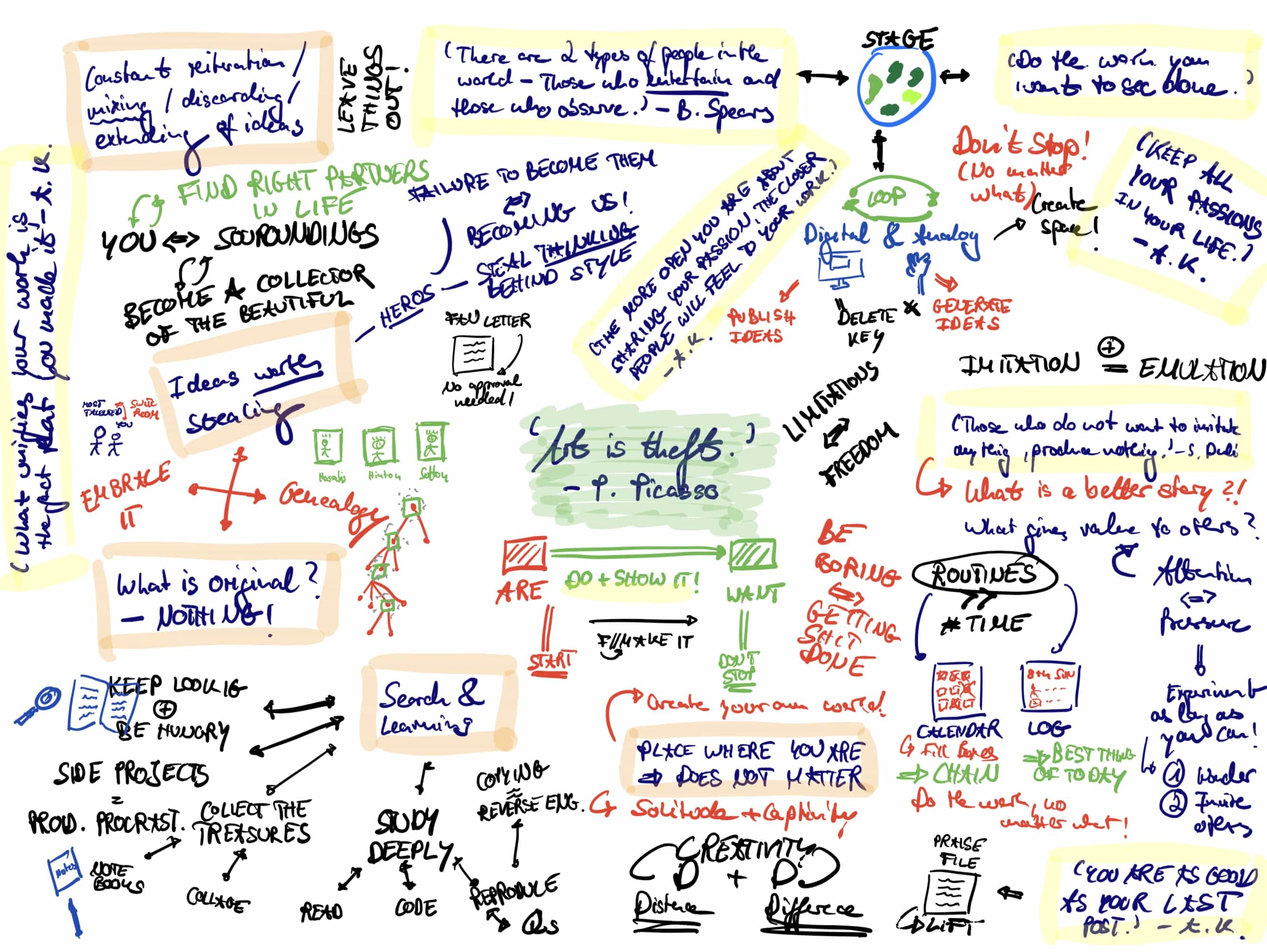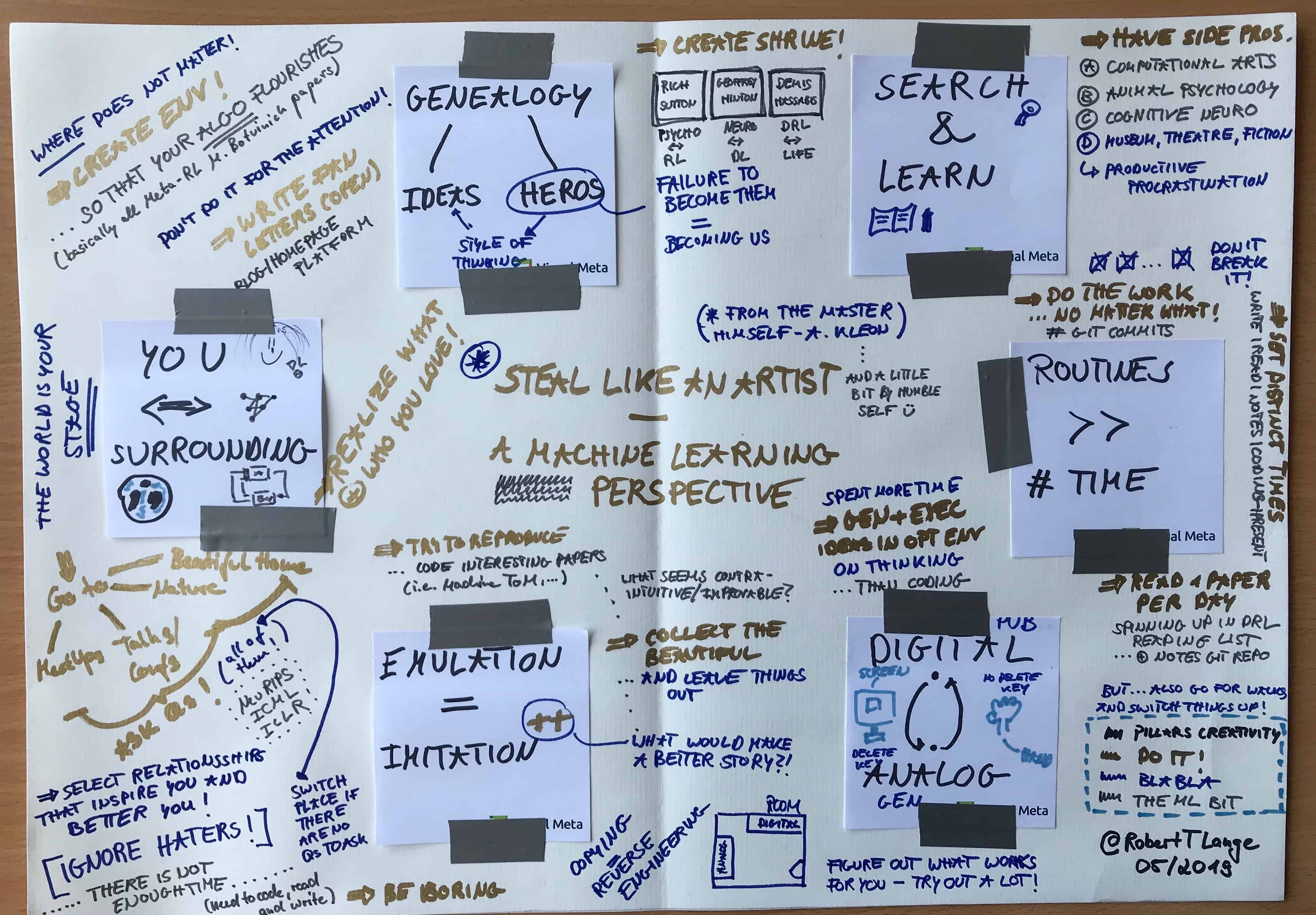Steal, Stole, Stolen - A ML Perspective!
Published:
Hola guapos! After finally deciding to stay in Berlin, I felt the desire to structure myself and to establish routines which are going to help me tackle the next phase of my life. Due to a fortunate visit to the National Gallery book store in London, I got to pick up Austin Kleon’s amazing piece of work “Steal Like an Artist”. A beautifully collected and visualized set of tricks to foster creativity.
And in this post I outline my takeaways as well as a more Machine Learning centered perspective on creative productivity. And to be completely honest here - I am mainly speaking to myself, hoping that I will implement most of these. So let’s dive in!
My (PERSONAL) Takeaways aka What I Got to Steal!
-
Your life can be whatever you want it to be! Your personal development crucially depends on what you keep in your direct surroundings. This includes everything and everyone. Relationships, topics, art, music, energy. But it is not like you can’t have an influence on things. You are actually in charge or as Kleon puts it “the world is your stage”! So put on a play and surround yourself with the beautiful. Ah, and there is definitely no time for haters. Get rid of them.
ML Perspective: Many Reinforcement Learning projects come up with their own environments in order to prove their point (… this includes almost any Matt Botvinick RL paper I have ever read). Sometimes it is not the algorithm that has to be changed but the application. Competing baselines are tuned to specific problems. Changing the problem can allow you to pull ahead (assuming you are in the business of comparing learning curves).
-
Imitate, Imitate, …, Emulate. Collect all the beautiful impressions and experiences that inspire you. Try to reproduce them in their most simplistic form - imitate them from the ground up. And then ask yourself: What is missing? How can I make things even better? Put my own stamp on them?
ML Perspective: To me this means that I try to read and replicate as much as I can fit in. Fortunately, the world wide web is full of open source ML afficianados who want to help you push the limits. Right now I have finished reading the Deep Q-Learning section of OpenAIs “Spinning Up in DRL” program. I started reimplementing DQN, DDQN and the Dueling Architecture with some GitHub help. There is nothing wrong with that (as long as you give credit). I know almost no code base which was written entirely from scratch. After I am done my thoughts will be shared in the next blog post.
-
Applied Heroism. Idols inspire us. We want to be like them. We will never be exactly like them. But this path of failure is ultimately what makes us unique. A mixture of the influences that we have collected and selected throughout our life. Nurture all the way. So dig deep into your heros and their heros!
ML Perspective: My personal heros include Geoffrey Hinton (for his stubborn belief in compositionality and connectionism), Richard Sutton (for translating psychology into mathematics and establishing basically everything in modern RL) and Demis Hassabis (for actually connecting the scientific potential of Deep Learning with the real world). But this is only a small (and pretty obvious) collection. I plan on setting up a small collage dedicated to their inspirations which will keep me going.
-
Loop between work settings (whoop whoop). No.1: You need some variation in your life. Always sitting in front of the same screen, in the same room, with exactly the same day plan makes dull. Go for a walk, go to the library, work in coffee shops, simply switch environments from time to time. No.2: Use your hands… not only for typing. Sketch out ideas, use tape, post-its and geometric shapes to make a point. Motor control is super important to stay engaged!
ML Perspective: Following Kleon’s advice I created two working stations in my home office space. One is purely digital - laptop, screens, iPad, etc.. The other one is purely analog. Paper, pens, post-its, tape, notebooks, pastel colors, even a polaroid camera. I often times find myself getting stuck in minor implementation bugs. After spending two hours debugging I usually feel bad. At least not productive. Switching to an environment without
cmd + zallows you to forget your local perfectionism and focus on the global perspective. Before starting to code you can sketch in pseudo-code what has to be done with which structures. And then do it. -
Routines » #Time. Everyone from time to time complains about a lack of time to - see friends - read papers - think deeply. But let’s be honest there are 168 hours in a week and they are spent somehow. It is a question of preferences and routines. By establishing a rhythm and sticking to it, you can carve out an hour a day for your dream project. And as long as this is done for long enough, we will reach Malcolm Gladwell’s famous 10000 hours. Start chains of habit and don’t break them.
ML Perspective: Count git commits. Look at the nice green boxes on GitHub - make them greener. Set yourself distinct times to read, to code, to summarize, to prepare documents. And set yourself measurable goals with lists and boxes to tick. Tick, tick, tick. Motivate yourself. No one else reliably will do so.
-
Life = Search + Learn. Don’t stop collecting the beautiful. And foster side projects which don’t have to be related to your work. Kleon calls it “productive procrastination”. Luckily interdisciplinary activities are hyped in the 21st century. Even if it only results in a discussion paragraph, stepping outside your own field will generate energy.
ML Perspective: This blog will be the collected front-end of my side projects. GitHub Pages and Jekyll provide a super easy to use static webdesign framework which allows anyone to have something up in running in two hours. Go to MeetUps, conferences, unrelated talks. ML is soooo broad. And science even broader. Pick what you like, discard the rest. You don’t need to be an expert in everything. Only in one thing.
Below you see my first visual note taking exercises (… I hope my handwriting does not screw everything up ![]() ). The left-hand side is supposed to summarize the general elements of advice anyone might want to know about. The right mind map is a more ML-specific version that is going to hang in my office for the next 3.5 years:
). The left-hand side is supposed to summarize the general elements of advice anyone might want to know about. The right mind map is a more ML-specific version that is going to hang in my office for the next 3.5 years:
Some final thoughts!
Credits where credits due: These are **my personal** takeaways, routines as well as mantras I wish to establish during the course of the weeks and months. Read the book yourself! And put your personal stamp on it. Again, steal only what you like and discard the rest! Be an artist, be a thief. Let's get things done!Love,
Rob P.S.: Thanks Mr Kleon. I admire you.


